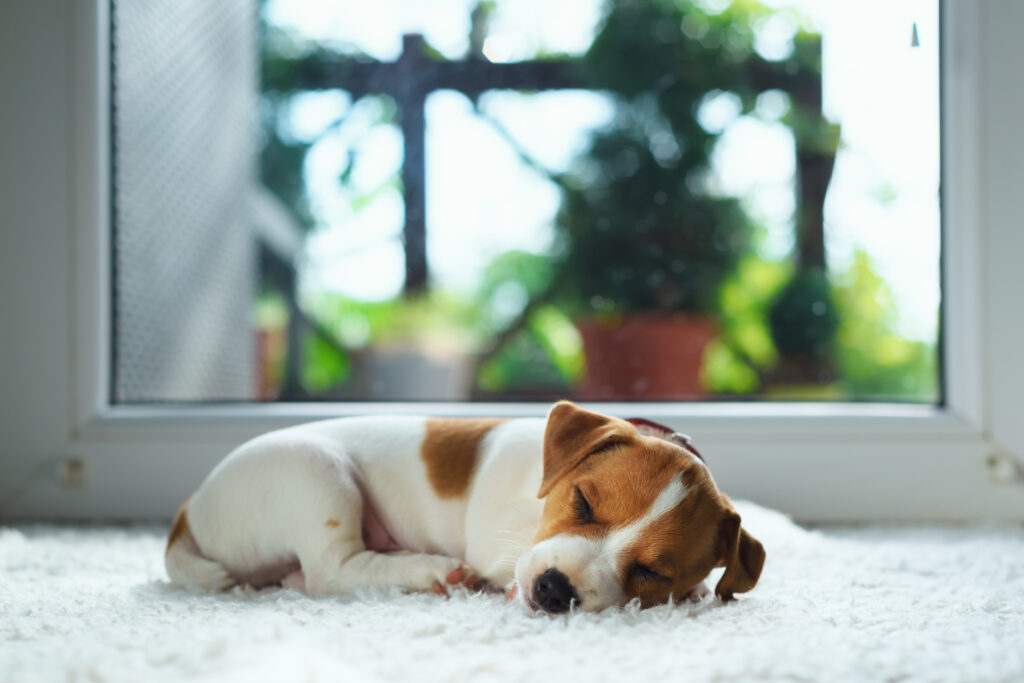Essential oil diffusion and feline/canine safety

January 27, 2023
Is a diffuser contraindicated in the presence of cats and dogs?
When it comes to welcoming a cat or dog into your home or office, you may be wondering whether the use ofa diffuser is contraindicated in the presence of cats and dogs. The following article aims to answer this question as fully as possible.
Why look into the contraindications to using a diffuser in the presence of cats and dogs?

Aromatherapy: a natural way to care for your pets
If you're already using essential oils for your own well-being or as part of your professional activities, it's only natural to want to give them to your pets too. However, as with their use on humans, essential oils have certain contraindications for our four-legged friends. They have a much more developed sense of smell than we do, and are not as sensitive to the active ingredients in essential oils. However, it is possible to use essential oils for the well-being of animals, to relieve some of their ailments or simply as a vapour in their presence.
Differentiating between the use of essential oils for cats and dogs
Cats and dogs do not react in the same way to essential oils. Cats are hypersensitive to odors, thanks to their Jacobson's organ, which makes diffusion an excellent solution for them.
Oral administration of essential oils is not recommended for cats. In addition to their hypersensitivity to odors, cats do not have a system for metabolizing certain aromatic molecules, and ingesting essential oils could have toxic side-effects on the liver or nervous system.
Which essential oils are contraindicated for diffusion in the presence of cats and dogs?
Due to their molecular composition, some essential oils are not suitable for diffusion, either to humans or animals. This is the case for certain neurotoxic molecules such as ketones. Others, such as those present in Peppermint essential oil(Mentha x piperita), can cause spasms that block breathing.
Here's a list of essential oils to avoid when diffusing:
- True cinnamon(Cinnamomum verum) and Chinese cinnamon(Cinnamomum cassia)
- Atlas cedar(Cedrus atlantica)
- Western cedar(Thuya occidentalis)
- Clove(Eugenia caryophyllus)
- Sage(Salvia officinalis)
- Peppermint(Mentha x piperita)
- Spearmint(Mentha spicata)
- Green oregano(Origanum vulgare) and compact oregano(Origanum compactum)
- Rosemary camphor(Rosmarinus officinalis camphoriferum) and Rosemary verbenone(Rosmarinus officinalis verbenoniferum)
- Savory(Satureja montana)
- Thyme(Thymus vulgaris thymoliferum)
Essential oils not contraindicated for diffusion in the presence of cats and dogs
Whether with a dog or a cat, you can use a diffuser without contraindication with, for example, the essential oils of :
- Lemon(Citrus limon) to purify the air, for example
- Orange(Citrus sinensis) for its calming effects
- Lemon Eucaplyptus(Eucalyptus citriodora) to repel insects
- Radiata Eucalyptus(Eucalyptus dives piperitoniferum) for treatment of ENT disorders
- True lavender(Lavandula angustifolia) for its calming and relaxing action
- Palmarosa(Cymbopogon martinii) for a wide range of ENT infections
- Tea tree(Melaleuca alternifolia) also for ENT infections
- Ravintsara(Cinnamomum camphora sb 1,8-cineole) to boost immunity.
What precautions should I take when using an essential oil diffuser with cats and dogs?

The vet to clear up any doubts about the contraindications to using a diffuser for cats and dogs
It's best to call your vet before diffusing any essential oil. Even if it's not necessarily intended for your pet, it will still be exposed to it. So, if your vet confirms that the essential oil you're interested in poses no risk to the animal, he or she will also be able to tell you what dilution to use.
For even more tips, don't hesitate to follow us on our social networks instagram, facebook and linkedin.
Correct use of the diffuser in the presence of cats and dogs
First of all, the room where you install the diffuser must be ventilated and have exits so that the animals can leave if disturbed by the smell of the essential oil. In addition, you'll need to respect the conditions of use of your diffuser, depending on whether it's an ultrasonic diffuser or a nebulizer, for example. Find out more in our article How many drops of essential oil should you put in a diffuser?
During the diffusion, if the animal loses its temper, starts meowing, barking or whining, remove it from the room immediately and turn off the diffuser. Finally, diffusion sessions should be limited to a maximum of 30 minutes, and only once or twice a day.
You now know when a diffuser is contraindicated in the presence of cats and dogs. However, if you take the utmost precautions, you can still treat your pets with certain essential oils in an entirely natural way. It would be a shame not to use aromatherapy to care for your four-legged friends.
Find a wide range of essential oils direct from the producer on our online store.
Sources: Guide pratique d'Aromathérapie chez l'animal de compagnie by Pascal Debauche and Dominique Baudoux and Vitalité Québec magazine article on the benefits of essential oil diffusion by Stéphanie Plamondon and Sarah Milon.



